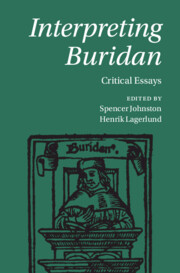Book contents
- Interpreting Buridan
- Interpreting Buridan
- Copyright page
- Dedication
- Contents
- Contributors
- Preface
- Abbreviations
- Introduction
- 1 The Philosopher as Arts Master
- 2 Principles in Buridan’s Logic of Consequences
- 3 Buridan on Paradox
- 4 Modality and Temporality in Buridan’s Logic
- 5 A Paradigm Change within Medieval Philosophy
- 6 Buridan’s Internalism
- 7 John Buridan on the Ontological Status of Artifacts
- 8 John Buridan on Final Causality
- 9 Female Physiology in John Buridan’s Quaestiones de secretis mulierum
- 10 Buridan on the Value of Emotions
- 11 Buridan on Happiness and the Good Life
- References
- Index
5 - A Paradigm Change within Medieval Philosophy
Semantics and Mereology in Aquinas vs. Buridan
Published online by Cambridge University Press: 01 February 2024
- Interpreting Buridan
- Interpreting Buridan
- Copyright page
- Dedication
- Contents
- Contributors
- Preface
- Abbreviations
- Introduction
- 1 The Philosopher as Arts Master
- 2 Principles in Buridan’s Logic of Consequences
- 3 Buridan on Paradox
- 4 Modality and Temporality in Buridan’s Logic
- 5 A Paradigm Change within Medieval Philosophy
- 6 Buridan’s Internalism
- 7 John Buridan on the Ontological Status of Artifacts
- 8 John Buridan on Final Causality
- 9 Female Physiology in John Buridan’s Quaestiones de secretis mulierum
- 10 Buridan on the Value of Emotions
- 11 Buridan on Happiness and the Good Life
- References
- Index
Summary
It is relatively well known that Buridan’s nominalist semantics changed “the rules of the game” in practically all fields of philosophy and science. For instance, in his semantics, the traditional distinction between essential and accidental predicates is mapped onto the Ockhamist distinction between absolute and connotative terms and concepts. It is, however, still not quite well understood what impact these “new rules” had in particular philosophical disciplines. This essay offers a case study of the late-medieval paradigm change brought about by nominalist “semantical innovations.” In particular, it contrasts Aquinas’ “semantics-driven mereology” with Buridan’s, set against the background of Buridan’s new, nominalist semantics, arguing that the two authors’ differences in their mereological considerations are rooted in the differences between their diverse semantic intuitions. The conclusion of the essay will provide a brief logical and historical evaluation of the paradigmatic changes brought about by these diverse intuitions.
Information
- Type
- Chapter
- Information
- Interpreting BuridanCritical Essays, pp. 69 - 87Publisher: Cambridge University PressPrint publication year: 2024
Accessibility standard: Unknown
Why this information is here
This section outlines the accessibility features of this content - including support for screen readers, full keyboard navigation and high-contrast display options. This may not be relevant for you.Accessibility Information
- 1
- Cited by
